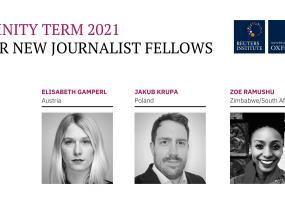Breaking News - the changing relationship between blogs and mainstream media
18 Sep 2009
Citizen journalism is here to stay – Reuters Institute report presented at the 2009 Oxford Social Media Convention
Former Reuters Fellow and Washington Post columnist John Kelly presented his report "Red Kayaks and Hidden Gold: the rise, challenges and value of citizen journalism" at the 2009 Oxford Social Media Convention on Sep 18.
The launch was accompanied by a debate featuring John Kelly, Richard Sambrook, Director BBC Global News Division and Jonathan Ford, Reuters Commentary Editor, moderated by Dr David Levy, Director of the Reuters Institute.
All speakers agreed on one thing: citizen journalism is here to stay. Regardless of what you think of it, there is no use arguing what place it should have in the wider media landscape: it has already made a place for itself, and it is developing constantly. Sambrook and Ford both expanded on how existing media organizations are working, or should be working, to incorporate citizen journalism. For example, they both pointed to the crucial importance of citizen journalism when reporting breaking news like disasters – but also discussed the need to go beyond breaking news when talking about citizen journalism. Sambrook suggested that the rise of citizen journalism meant a paradigm shift for foreign coverage: the 'old model' of maintaining a bureau or parachuting in journalists from the 'home country', both at great expense, seemed less and less relevant as it is now possible for people actually living in the area (and with crucial local knowledge) to provide coverage. Ford predicted that citizen journalism would play a role in the 'return of the portal' – as linking and aggregation becomes an increasingly imporant driver of news consumption, portal-style sites to help users navigate the information flow are becoming more and more important. And the most popular ones seem to be the ones aiming for specialist and niche audiences, who are in many cases more knowledgable than the journalists. Thus navigational sites may well incorporate citizen-producers to a greater degree in the future – but not primarily providing content but rather ranking, authentication, and relevance assessments of existing content. Kelly pointed to the wide range and diversity of citizen journalism as proof that it is now an established field – sometimes a complement to existing journalism provision, but also sometimes an outright replacement. It's not only technology driving this development but also a widespread sense that the mainstream media are failing in their coverage – journalists are becoming part of the establishment rather than being outsiders critiquing it, and this has created a niche for citizen journalism as an alternative to the mainstream. Still, all speakers seemed to agree – unsurprisingly perhaps – that the gatekeeping role of (mainstream) journalism would be increasing rather than decreasing in importance in the future. With ever-intensifying information flows, having trusted organizations staffed by trained people making decisions about relevance and importance will be more important than ever.
For more comment and media coverage go to: Journalism.co.uk Guardian Online





